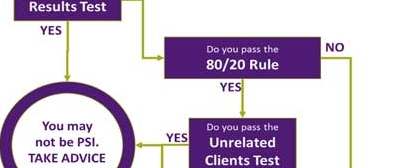
27 Dec Contractors and Personal Services Income
As far as misunderstood concepts go the Personal Services Income (PSI) rules are about as misunderstood as the Phantom from the opera.
The first thing to understand about being a contractor is the 80/20 rule does not determine whether you can be a contractor or not – It is just part of the rules that govern how your income will be taxed if you are a contractor.
The 80/20 Rule does not have any bearing on whether you can be a contractor or not – Don’t believe your BBQ adviser, he’s WRONG!!
Let me explain that a bit more; In most circumstances, you can be a legitimate contractor even when you provide services to a single customer. Of course, you must consider the rules governing sham contracts (which I won’t discuss today) but you can contract to a single customer in most genuine circumstances.
The 80/20 rule is part of the Tax Office’s Personal Services Income (PSI) rules. The PSI rules are what contractors should seek to understand because they determine how your contract income will be taxed.
To properly understand the PSI rules it is worthwhile considering that the starting point is for all PSI income to be taxed to the individual providing the service irrespective of whether you contract through a trust, company, or partnership. The PSI rules do however, contain a range of exceptions to that proposition (including the 80/20 rule) and those exceptions enable a properly structured arrangement to be taxed more effectively.
What are Personal Services and How Does PSI Work?
Personal services income is any income produced mainly from your personal skills or efforts. So, if you are a tradesperson, a masseuse, a gardener, or an accountant you will be providing personal services and your income is presumed to be PSI income unless you can show one of the exceptions applies.
If you cannot apply one of the PSI exceptions, then no matter whether you are trading through a company, partnership, or trust the income will be taxable directly to you at personal tax rates. That is important because it could mean you will be paying more in tax than you could be if the interposed entity was effective. You will probably also be paying higher administration and maintenance costs for your company, trust or partnership so getting it wrong can be costly.
The Personal Services Income Exceptions
Assuming you are providing personal services, the exceptions contain 3 steps as demonstrated in the flowchart below.
Exception Test 1: Results Test
If you (irrespective of your trading structure) are being paid for a result rather than for your time then you’re a good deal towards passing this test. To be paid for a result you will be:
- Paid for the job done rather the time taken to do the job; and
- Be entitled to get others to do your work if you are unavailable for any reason such as illness or holiday; and
- Provide your own tools; and
- Liable to rectify any defects in your work at your own cost.
Essentially you will not be controlled in how, where, or when you do your work. In other words, you will be your own boss.
The 80% Rule – Otherwise known as the 80/20 rule
 The much misunderstood 80/20 rule only becomes a consideration if you fail the results test. Then, even if you pass the 80/20 rule you will still need to satisfy one of three other tests to fall outside the PSI rules.
The much misunderstood 80/20 rule only becomes a consideration if you fail the results test. Then, even if you pass the 80/20 rule you will still need to satisfy one of three other tests to fall outside the PSI rules.
You cannot pass the 80/20 test if 80% or more of your income is derived from one single customer, where customer includes related persons so those creative arrangements to charge the principal or his wife will not work. You can still be a contractor though, and even contract through a trust, company, or partnership. In that case you income will be 100% taxable to you as the person providing the services, you will have limited scope for creative tax planning, but there may be asset protection benefits.
Even if you pass the 80/20 test, you must also pass one of the following tests.
The Unrelated Clients Test
You will pass this test if you provide services to at least 2 clients who are not related to each other or to you.
The Employment Test
You will pass this test if you have employees who carry out a minimum of 20% of the value of the work or if you have an apprentice for half the tax year.
The Business Premises Test
You will pass this test if you have a separate business premise for the full year that is not connected to your residence.
How Can the Team at Grow Help?
There are two steps to developing an effective PSI tax strategy.
- Ensure you have an appropriate contracting arrangement in place so that as far as possible you meet the Results Test; and
- Trade your business through the appropriate trading structure. Whether you trade through a partnership, trust, or company will be dictated by your circumstances and each has different potential tax outcomes. We can explain your options and the likely outcome from both a tax and risk perspective.
Conclusion
The Personal Services Income regime is complex so don’t listen to the good old BBQ advisors who tell you the 80/20 rule is all you need to worry about. There are penalties for getting it wrong and they can be substantial so take our advice early and sleep easy knowing that you are achieving the optimum outcome.
For more information give me a call in the office on (07) 5448 9600 or CLICK HERE to drop me a message.


